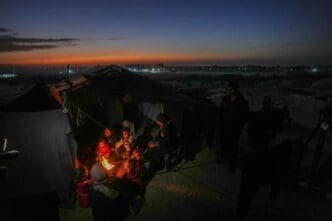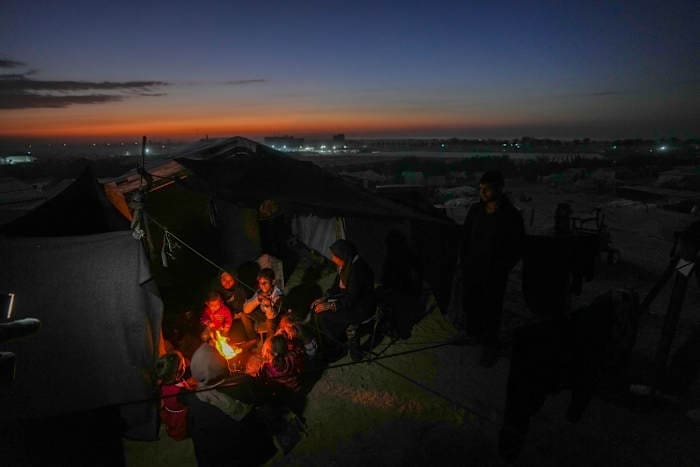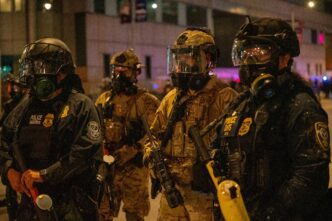As winter descends upon the Gaza Strip, nearly two million displaced Palestinians grappling with the aftermath of a prolonged conflict with Israel face severe challenges against the harsh cold. Living conditions have deteriorated significantly for those residing in makeshift shelters, highlighting an escalating humanitarian concern.
The Gaza Strip, home to almost two million Palestinians, is experiencing severe winters as its inhabitants continue to suffer from the impacts of a protracted 14-month conflict with Israel. Many of these displaced individuals reside in fragile tents and shelters that offer inadequate protection against the elements. Reports indicate a desperate shortage of essential winter supplies, such as blankets and warm clothing. Aid workers on the ground reveal that the tents have become increasingly worn over time, further exposing families to cold and wet conditions.
Testimonies from displaced residents such as Shadia Aiyada underscore the dire situation. Having been relocated from Rafah, she recounts the fear her family experiences whenever adverse weather conditions are forecasted. With only one blanket and a hot water bottle shared among her eight children, Aiyada’s fragile tent is barely able to withstand the wind, often prompting fears of its collapse. Many, like Aiyada, are forced to borrow clothing from relatives and friends to keep their families warm.
The United Nations has issued warnings about the precarious living conditions in these makeshift shelters, noting that nearly a million individuals require winter supplies. Unfortunately, these provisions have become prohibitively expensive, adding financial strain to already burdened families. Infectious diseases are also a growing concern, with malnutrition on the rise and cold conditions exacerbating health risks.
Despite year-long preparations by the United Nations Relief and Works Agency (UNRWA), the number of winter supplies distributed falls short of the need. Between November and December, around 6,000 tents were distributed in northern Gaza, but logistical challenges and restrictions have impeded wider distribution efforts. As of now, a considerable number of supplies, including around 600,000 blankets and 33 truckloads of mattresses, remain stuck outside Gaza due to regulatory obstacles and prioritization of food aid over other necessities.
The Israeli government, responsible for coordinating aid shipments into Gaza, asserts that efforts have been ongoing to facilitate the transfer of essential winter gear. However, delays and strict approval processes for aid items further hinder the timely arrival of supplies. The situation is compounded by economic challenges as local residents struggle with inadequate income levels, leaving them unable to afford the expensive winter clothing available in local markets.
Reda Abu Zarada, another displaced Palestinian, describes her family’s hardships vividly. With inadequate doors to shield against rats and severely torn tents, Zarada and her family endure freezing temperatures at night, often waking up to frost underfoot. Afraid for the safety of her children, she persists in providing warmth, albeit minimally, by cooking simple meals over fires fueled by scraps.
Amidst these struggles, the toll of the conflict remains heavy. The Gaza Health Ministry reports significant casualties, with a substantial number of women and children among the fatalities. While negotiations between Israel and Hamas show potential progress towards a ceasefire that could amplify aid efforts, the immediate needs of the population remain overwhelming. Autonomous economic improvements seem distant as residents and aid workers continue to grapple with a harsh winter reality symbolized by the hardships faced by individuals such as Omar Shabet, who refrains from lighting fires out of fear of becoming a target.
The bleakness of the situation is palpable, with families cocooned against frost and bleakness each night, yearning for a return to normalcy. The absence of adequate humanitarian aid highlights the urgent need for international intervention and solutions to ease their suffering.
The harsh winter conditions in Gaza serve as a stark reminder of the humanitarian crisis unfolding in the region. As Palestinians contend with insufficient resources and ongoing conflict, there is an urgent call for global attention and action to mitigate their suffering. For now, the displaced populations in Gaza continue to endure under challenging circumstances, awaiting a resolution that promises hope for a safer and warmer future.
Source: News4jax








